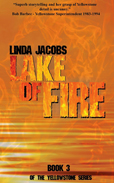
 |
Set in 1900, nearly a century before the 1988 fires that ravaged Yellowstone (the focus of the first book in the series), this novel delivers the same electric energy in depicting characters that interact with the spirit of Yellowstone as in the earlier books. While fire is not as encompassing in this particular story, it undoubtedly plays a pivotal role. The author’s ability to move the plot and character development forward while painting a vivid picture with sensory images is on full display.
When outlaws overtake a stagecoach carrying Laura Fielding to Yellowstone’s Lake Hotel, the paths of the main characters—Laura and her rescuer, William “Cord” Sutton—collide. Witnessing the driver’s death marks the end of Laura’s innocence and entry into a world of adventure that she had pined for since being mesmerized by photographer Henry Jackson’s studies of Wyoming. From battling bears to reeling in trout, Laura develops an identity to which she fiercely clings.
Laura and Cord’s travels on Dante are accentuated by the panoramic portrait of the area's hot springs and lakes where volcanic craters once stood. Readers will be so enchanted by the duo’s journey to the Lake Hotel that it is arguably a moment of sadness when they finally arrive and reacquaint themselves with reality. At the plot’s core is Hank Falls and Cord’s bid for the Lake Hotel.
Within this framework, Jacobs integrates Bitter Waters—Cord’s uncle and the catalyst to his parents’ death. Despite being adopted into an affluent white family, Cord is plagued by his two identities. He is the adopted child of a white family, but his ethnicity is that of a Nez Perce. Chaos ensues as numerous plotlines of blatant racism, family turmoil, revenge vendettas, and a clear-cut abuse of power by Captain Feddors intersect toward a spectacular, unmissable finish.
RECOMMENDED by the US Review